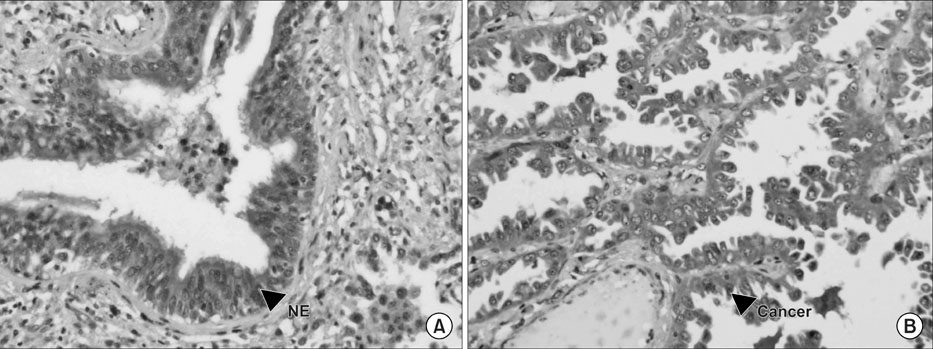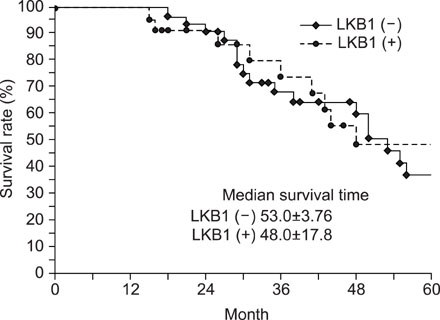Tuberc Respir Dis.
2008 May;64(5):362-368. 10.4046/trd.2008.64.5.362.
The Clinical and Histopathologic Features according to Loss of LKB1 Protein Expression on Primary Lung Cancer
- Affiliations
-
- 1Department of Internal Medicine, College of Medicine, Wonkwang University, Iksan, Korea. yshpul@wonkwang.ac.kr
- 2Department of Pathology, College of Medicine, Wonkwang University, Iksan, Korea.
- 3Department of Therapeutic Radiology and Oncology, College of Medicine, Wonkwang University, Iksan, Korea.
- 4Department of Radiology, College of Medicine, Wonkwang University, Iksan, Korea.
- 5Research Institute, National Cancer Center, Goyang, Korea.
- KMID: 1478192
- DOI: http://doi.org/10.4046/trd.2008.64.5.362
Abstract
-
BACKGROUND: LKB1(STK11) is a serine/threonine kinase that functions as a tumor growth suppressor. The functions of LKB1 in lung cancer are not completely understood. This study evaluated the relationship between LKB1 protein expression and the clinicopathological features in lung cancer tissues.
METHODS
The expression of LKB1 was studied in paraffin-embedded tumor blocks, which were obtained from 77 patients who had undergone surgery at Wonkwang University Hospital. The expression of the LKB1 protein was considered positive if the staining intensity in the tumor tissue adjacent to the normal airway epithelium was >30%.
RESULTS
The LKB1 expression was positive in 31 (40%) of samples. Loss of LKB1 expression was significantly associated with being male, smoking history, and squamous cell carcinoma. In the peripheral sites, the loss of LKB1 expression was strongly associated with a smoking history. A loss of LKB1 expression was more frequently associated with progression according to TNM staging, particularly more than T2, N progression.
CONCLUSION
There was a significant relationship between the loss of the LKB1 protein and gender, smoking history, and histological type in primary lung cancer. Although LKB1 expression was not found to be a significant prognostic factor, further studies with a larger cohort of patient's lung cancer tissue samples will be needed to confirm this.
Keyword
MeSH Terms
Figure
Reference
-
1. Parkin DM, Bray F, Ferlay J, Pisani P. Global cancer statistics, 2002. CA Cancer J Clin. 2005. 55:74–108.2. Minna JD, Ginsberg RJ, Ihde DC. DeVita VT, Hellman S, Rosenberg SA, editors. Chapter 30. Cancer of lung. Cancer: principles and practice of oncology. 1997. 5th ed. Philadelphia: Lippincott-Raven Pub.;849.3. Hemminki A, Markie D, Tomlinson I, Avizienyte E, Roth S, Loukola A, et al. A serine/threonine kinase gene defective in Peutz-Jeghers syndrome. Nature. 1998. 391:184–187.4. Boardman LA, Thibodeau SN, Schaid DJ, Lindor NM, McDonnell SK, Burgart LJ, et al. Increased risk for cancer in patients with the Peutz-Jeghers syndrome. Ann Intern Med. 1998. 128:896–899.5. Ghaffar H, Sahin F, Sanchez-Cepedes M, Su GH, Zahurak M, Sidransky D, et al. LKB1 protein expression in the evolution of glandular neoplasia of the lung. Clin Cancer Res. 2003. 9:2998–3003.6. Cox G, Jones JL, Andi A, Waller DA, O'Byrne KJ. A biological staging model for operable non-small cell lung cancer. Thorax. 2001. 56:561–566.7. Diez M, Pollán M, Maestro M, Torres A, Ortega D, Gómez A, et al. Prediction of recurrence by quantification of p185neu protein in non-small cell lung cancer tissue. Br J Cancer. 1997. 75:684–689.8. Hemminki A, Tomlinson I, Markie D, Järvinen H, Sistonen P, Björkqvist AM, et al. Localization of a susceptibility locus for Peutz-Jeghers syndrome to 19p using comparative genomic hybridization and targeted linkage analysis. Nat Genet. 1997. 15:87–90.9. Jenne DE, Reimann H, Nezu J, Friedel W, Loff S, Jeschke R, et al. Peutz-Jeghers syndrome is caused by mutations in a novel serine threonine kinase. Nat Genet. 1998. 18:38–43.10. Tiainen M, Ylikorkala A, Makela TP. Growth suppression by Lkb1 is mediated by a G1 cell cycle arrest. Proc Natl Acad Sci USA. 1999. 96:9248–9251.11. Shen Z, Wen XF, Lan F, Shen ZZ, Shao ZM. The tumor suppressor gene LKB1 is associated with prognosis in human breast carcinoma. Clin Cancer Res. 2002. 8:2085–2090.12. Karuman P, Gozani O, Odze RD, Zhou XC, Zhu H, Shaw R, et al. The Peutz-Jegher gene product LKB1 is a mediator of p53-dependent cell death. Mol Cell. 2001. 7:1307–1319.13. Avizienyte E, Loukola A, Roth S, Hemminki A, Tarkkanen M, Salovaara R, et al. LKB1 somatic mutations in sporadic tumors. Am J Pathol. 1999. 154:677–681.14. Ji H, Ramsey MR, Hayes DN, Fan C, McNamara K, Kozlowski P, et al. LKB1 modulates lung cancer differentiation and metastasis. Nature. 2007. 448:807–810.15. Sanchez-Cespedes M, Parrella P, Esteller M, Nomoto S, Trink B, Engles JM, et al. Inactivation of LKB1/STK11 is a common event in adenocarcinomas of the lung. Cancer Res. 2002. 62:3659–3662.16. Onozato R, Kosaka T, Achiwa H, Kuwano H, Takahashi T, Yatabe Y, et al. LKB1 gene mutations in Japanese lung cancer patients. Cancer Sci. 2007. 98:1747–1751.17. Parkin DM, Pisani P, Lopez AD, Masuyer E. At least one in seven cases of cancer is caused by smoking. Int J Cancer. 1994. 59:494–504.18. Fraumeni JF JR, Schottenfeld D, Searle JG. Cancer epidemiology and prevention. 1996. 2nd ed. New York: Oxford University Press.19. Sanchez-Cespedes M, Ahrendt SA, Piantadosi S, Rosell R, Monzo M, Wu L, et al. Chromosomal alterations in lung adenocarcinoma from smokers and nonsmokers. Cancer Res. 2001. 61:1309–1313.
- Full Text Links
- Actions
-
Cited
- CITED
-
- Close
- Share
- Similar articles
-
- Liver Kinase B1 Mediates Its Anti-Tumor Function by Binding to the N-Terminus of Malic Enzyme 3
- LKB1/STK11 Tumor Suppressor Reduces Angiogenesis by Directly Interacting with VEGFR2 in Tumorigenesis
- Loss of LKB1 Protein Expression Correlates with Increased Risk of Recurrence and Death in Patients with Resected, Stage II or III Colon Cancer
- Tumor Suppressor Serine/Threonine Kinase LKB1 Expression, Not Kinase Activity, Increased in the Vascular Smooth Muscle Cells and Neointima in the Rat Carotid Artery Injury Model
- Immunohistochemical Study of the Expression of the p53 Protein in Primary Lung Cancer



